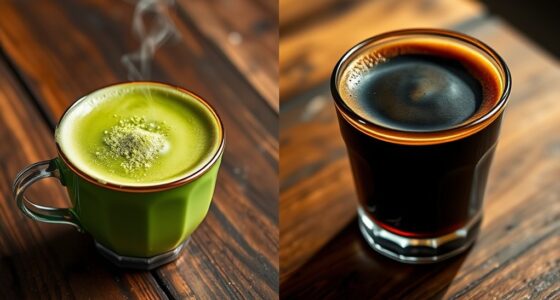Using black pepper doesn't break your fast, especially when you consume it in moderation. With about 2.5 calories per teaspoon, it has a minimal impact on your body's fasting state. The piperine in black pepper can even support your metabolism and improve nutrient absorption. Aim for about 1/4 teaspoon to enhance flavor without disrupting benefits like autophagy or gut rest. However, keep an eye on your body's reactions, as excessive amounts may stimulate appetite. If you're curious about maximizing your fasting experience, there's plenty more to explore on this topic.
Key Takeaways
- Black pepper has negligible calories, approximately 2.5 per teaspoon, making it unlikely to break a fast.
- Using black pepper in moderation (up to 1/4 teaspoon) can enhance flavor without disrupting fasting benefits.
- Piperine in black pepper may stimulate digestion, so it's essential to monitor your body's response during fasting.
- Incorporating black pepper can aid nutrient absorption and provide antioxidant benefits while fasting.
- Avoid spice blends with added sugars or calories to maintain the integrity of your fast.
Understanding Fasting Goals

When you set out to fast, understanding your goals is essential for making the right dietary choices.
Whether you're aiming for autophagy, gut rest, or fat burning, each goal dictates your approach. If you're focused on autophagy or gut rest, you'll need to stick to non-caloric options to avoid breaking your fast.
Conversely, weight loss may allow for minimal caloric intake from non-insulinogenic foods and drinks. It's imperative to monitor your body's responses, as individual metabolic health can vary.
Keep an eye on blood glucose and insulin levels, since spikes can hinder effective fat burning. Consulting reputable sources can help clarify fasting rules and tailor your practices to align with your specific health objectives.
Nutritional Profile of Pepper

Pepper, a common spice found in kitchens worldwide, boasts a unique nutritional profile that can complement your fasting journey.
Black pepper contains negligible calories, with around 2.5 calories per teaspoon, making it unlikely to impact your weight loss or metabolic health goals considerably. It's rich in piperine, which enhances nutrient absorption and may support metabolic processes during fasting.
Additionally, the antioxidant properties of black pepper can reduce oxidative stress, promoting overall health. You can incorporate black pepper into your meals for added flavor without breaking your fast.
However, be mindful of excessive consumption, as it might stimulate digestive processes and interfere with strict fasts aimed at autophagy or gut rest.
Effects of Piperine on Metabolism

The active compound piperine in black pepper plays a significant role in enhancing metabolic functions, making it a valuable addition to your fasting regimen.
By stimulating metabolic processes, piperine can increase thermogenesis and fat oxidation, which may assist in weight management while you fast. It also enhances the bioavailability of nutrients, potentially improving their effects during fasting.
Consider these benefits of piperine:
- Boosts lipid metabolism and helps regulate glucose levels.
- May reduce oxidative stress with anti-inflammatory properties.
- Improves the absorption of curcumin and other beneficial compounds.
Incorporating piperine into your fasting plan can support overall metabolic health, making your fasting experience even more effective.
Acceptable Amounts of Pepper

When it comes to adding pepper during your fast, moderation is key.
A pinch or up to 1/4 teaspoon is generally acceptable, as it's low in calories and shouldn't disrupt the fasting benefits you're aiming for.
Just keep an eye on how your body responds, since everyone's tolerance can vary.
Caloric Content of Pepper
Seasoning your meals with black pepper can be a great way to enhance flavor without considerably impacting your fasting goals. With only about 2 calories per teaspoon, the caloric content is negligible.
Using small amounts, like a pinch, typically won't disrupt fasting states aimed at autophagy or gut rest. Plus, pepper can add a kick to non-caloric beverages you enjoy during fasting.
- A little goes a long way.
- It won't derail your weight loss efforts.
- Piperine in pepper might even boost metabolism!
Just remember, moderation is key. While small amounts are fine, consuming it in larger quantities could contribute to your caloric intake, so keep it light during your fasting periods.
Effects on Fasting Benefits
Using black pepper in moderation can actually enhance your fasting experience without compromising its benefits. When you add a small amount of black pepper to your meals or even your ginger tea, you're likely to maintain your fasting goals while reaping potential perks like improved nutrient absorption.
The negligible calories in minimal pepper won't break your fast or disrupt your weight loss efforts. However, be cautious—excessive use might trigger an insulin response or cause gastrointestinal discomfort, which could impact fasting benefits.
If your aim is strict autophagy, consider limiting or avoiding black pepper altogether to stay in a non-caloric state. Remember, a little seasoning can go a long way in supporting your fasting journey!
Impact on Digestive Processes

When you add pepper to your meals, its piperine content can stimulate digestive enzymes and enhance nutrient absorption.
This might impact your fasting goals, especially if you're aiming for autophagy or gut rest.
It's important to reflect on how even small amounts of pepper can influence your digestive processes during a fast.
Pepper's Digestive Stimulation Effects
Pepper, particularly black pepper, can greatly influence your digestive processes due to its active compound, piperine.
Even a little bit of pepper can stimulate digestive enzymes, increasing gastric secretion. This might lead to heightened appetite and disrupt the rest period you aim for at the end of your fast.
While pepper is low in calories, its effects on digestion can provoke a physiological response that interferes with fasting goals like gut rest or autophagy.
- Watch how your body reacts to pepper during fasting.
- Remember, small amounts may not break your fast greatly.
- Stay mindful of how digestive stimulation impacts your fasting experience.
Careful monitoring is key to balancing flavor and fasting benefits.
Impact on Gut Health
One significant aspect of black pepper is its potential to enhance gut health, primarily through its active compound, piperine. This compound boosts digestion by increasing the bioavailability of nutrients and stimulating digestive enzymes, which can be especially beneficial during fasting.
Piperine may also promote gut motility, helping move food through your digestive tract, a factor to take into account when reintroducing food after fasting. While black pepper has minimal calories, consuming it might trigger digestive processes that interfere with autophagy and gut rest.
Additionally, its anti-inflammatory properties can support overall gut health, though excessive amounts could lead to discomfort. Keep an eye on your body's response when incorporating black pepper during fasting to ascertain it aligns with your health goals.
Role in Nutrient Absorption
Although you might think of black pepper as just a seasoning, its active compound, piperine, plays an essential role in enhancing nutrient absorption.
By increasing the bioavailability of certain vitamins and minerals, black pepper can be especially beneficial during your eating periods after fasting. It stimulates digestive enzymes, helping your body break down and absorb nutrients more efficiently.
Here are some benefits of incorporating black pepper into your post-fast meals:
- Boosts absorption: Piperine enhances the uptake of nutrients, including curcumin from turmeric.
- Supports gut health: Its digestive benefits can help maintain a healthy digestive system.
- Low-calorie option: Black pepper adds flavor without greatly impacting insulin levels.
Using black pepper can optimize your nutrient replenishment after fasting.
Comparison With Other Spices

While many spices can be included in fasting practices without breaking a fast, black pepper stands out as a particularly low-calorie option. Unlike spices like cinnamon, which can impact insulin levels, black pepper remains neutral, making it a safe choice for your fasting routine. Other spices, such as ginger and turmeric, offer additional benefits; ginger aids in lipolysis, while turmeric promotes autophagy through curcumin. Here's a quick comparison of black pepper with other popular spices:
| Spice | Caloric Content | Fasting Benefits |
|---|---|---|
| Black Pepper | 0 | Minimal impact on insulin |
| Cinnamon | 6 | Enhances insulin sensitivity |
| Ginger | 2 | Aids in fat breakdown |
| Turmeric | 0 | Stimulates autophagy |
| Sage | 0 | Provides antioxidants |
Incorporating these spices can enhance flavors during your eating window without disrupting your fast.
Recommendations for Use

To make the most of black pepper during your fasting periods, it's best to use it in moderation. This spice is low in calories and won't greatly impact your insulin levels, making it a safe choice.
Plus, it can enhance nutrient absorption, especially when paired with turmeric. Incorporating black pepper can keep your meals flavorful without breaking your fast.
Here are some recommendations for using black pepper:
- Sprinkle it on vegetables to add a kick without adding calories.
- Mix it into soups or broths for extra flavor while maintaining low caloric intake.
- Combine it with other herbs to create delicious, fasting-friendly seasonings.
Remember to monitor how your body responds to verify it aligns with your fasting goals!
Personalize Your Fasting Approach

Personalizing your fasting approach is essential for achieving your specific goals, whether that's autophagy, weight loss, or improved metabolic health. Understanding how spices like pepper fit into your regimen can make a difference.
| Goal | Acceptable Foods/Drinks | Monitoring Tips |
|---|---|---|
| Autophagy | Water, herbal teas, pepper | Note hunger levels |
| Weight Loss | Low-calorie seasonings | Journal cravings |
| Metabolic Health | Black coffee, spices | Track energy and mood |
| Appetite Control | Vegetables, pepper | Observe eating patterns |
| Flavor Enhancement | Spices, herbs | Experiment creatively |
Experimenting with spices can enrich your fasting experience. Keep a journal to discover what truly works for your body and fasting objectives.
Summary of Key Points

Understanding how pepper fits into your fasting routine can be key to maximizing its benefits. You'll be pleased to know that black pepper is generally acceptable during fasting, as it contains minimal calories and doesn't greatly impact insulin or blood glucose levels.
Here are some key points to remember:
- The compound piperine in black pepper may enhance nutrient absorption without breaking your fast.
- Use pepper in moderation to avoid any digestive discomfort.
- Avoid blends that have added sugars or caloric components.
Incorporating small amounts of pepper can add flavor to your meals without disrupting your fasting state, making it a great choice for enhancing your fasting experience.
Enjoy the taste while staying on track!
Frequently Asked Questions
Is Pepper Allowed in Fasting?
When you're fasting, you might wonder if pepper's allowed.
Generally, it's considered acceptable since it has minimal calories and doesn't greatly impact insulin levels. Using small amounts of black pepper can even enhance your metabolism, potentially supporting your weight loss goals.
Just pay attention to how your body reacts, as individual tolerance can vary. Enjoy adding flavor during your eating window without worrying about breaking your fast with pepper.
Will Spices Break a Fast?
Imagine exploring a quiet garden, where each spice is a vibrant flower.
When you're fasting, most spices, like black pepper, won't disrupt your path. They're low in calories and can actually enhance your experience without affecting your goals.
Think of them as adding a splash of color to your plate while you maintain your focus.
However, if you’re strict about fasting, it’s wise to limit even these flavorful additions for the best results. Additionally, some people prefer to completely forego any additions to their fasting coffee in order to adhere strictly to their fasting routine. For those individuals, the best allinone coffee machines offer a convenient solution, allowing for the creation of perfectly brewed, unadulterated coffee with minimal effort. These machines often come equipped with built-in grinders, milk frothers, and customizable settings to cater to individual taste preferences. By investing in one of these machines, fasting individuals can ensure their coffee remains pure and fasting-friendly. Moreover, for those looking to enhance their fasting experience while still sticking to their guidelines, exploring alternative beverages can be beneficial. Teeccino, an herbal coffee alternative, is gaining popularity among fasting enthusiasts for its rich flavor without the caffeine. If you’re curious about where to find teeccino locations, you can easily locate nearby stores online or through the brand’s official website, allowing you to explore new options without compromising your fasting routine.
Does Salt and Pepper Break a Fast?
When you're fasting, you're likely wondering if salt and pepper break your fast.
Both are generally considered non-caloric, so they won't disrupt your fasting state. You can use them to enhance flavor without worrying about calories.
Just keep salt intake in check to avoid dehydration.
Spices like black pepper might even help you feel fuller, making it easier to stick to your fasting routine.
Enjoy seasoning your meals while fasting!
What Food Doesn't Break a Fast?
When you're fasting, non-caloric foods are your best friends. You can enjoy herbs and spices like black pepper, cinnamon, and turmeric without breaking your fast. These add flavor without significant calories.
You might also consider drinking water, herbal teas, or black coffee to stay satisfied. Just remember, moderation is key; too much of anything, even non-caloric options, could stimulate digestion.
Stick to these choices to keep your fasting experience enjoyable!
Conclusion
In the delicate dance of fasting, pepper can be a subtle partner, enhancing your experience without breaking your resolve. Just a pinch can awaken your senses and ignite your metabolism, all while keeping your fasting goals intact. Picture a sprinkle of black pepper transforming your meals into vibrant symphonies of flavor, enriching your journey. Ultimately, it's about finding balance—embracing the spice of life while staying true to your path. So, savor the journey and let pepper be your ally.










